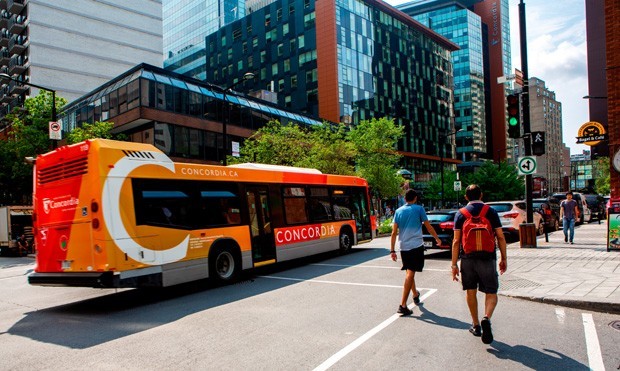Four major Faculty of Arts and Science research projects have secured seed grant funding from Volt-Age at Concordia University under the CFREF program. This significant investment is meant to jump-start large scale projects that will bridge the gap between academia and industry to develop green energy and foster sustainable communities.
“Indigenous Clean Energy Sovereignty: Mapping a Way forward with Cogenerative Journalism”
This project, led by Aphrodite Salas, associate professor in the Department of Journalism, focuses on the clean energy sovereignty journeys of Indigenous communities in the land known as Canada. Decarbonization and clean energy sovereignty processes can be challenging for Indigenous communities as the systems and structures in place including the media, are often skewed or biased. This research initiative seeks to define and develop a new model of collaborative journalism by creating research-creation journalism and new teaching methods based on a more holistic model of working with Indigenous peoples and communities. The new model places the principles of reconciliation, collaboration and inclusivity at the centre of the journalistic process. It aims to aims to shift the historically negative depiction of Indigenous peoples in Canadian media through journalism that is more collaborative and inclusive.
“Building a Data Collaborative for Tracking Aggregate Greenhouse Gas Emissions in Greater Montréal”
This research project, led by Damon Matthews, professor in the Department of Geography, Planning and Environment, aims to help cities track greenhouse gas emissions and take action on climate change by creating a collaborative effort to share emissions data. By working together across different sectors, including private companies and government agencies, participants can develop strategies to reduce emissions more effectively. The project will start in Montreal, where there's currently a lack of large-scale data sharing for emissions. By establishing rules for sharing data safely and effectively, the project hopes to provide valuable information for creating policies and innovations to reduce emissions and transition to cleaner energy sources. The goal is to use Montreal's experience as a model for other cities facing similar challenges, helping them tackle climate change more effectively. Matthews is also the Concordia Research Chair in Climate Science and Sustainability.
“Comparative Analysis of the Experience and Morphology of Collective Transport Systems and their Cities: CAMMM Atlas as Didactic Tool for Planning Sustainable Mobility”
The CAMMM Atlas research project, led by Pierre Gauthier, associate professor in the Department of Geography, Planning and Environment, addresses the growing need for sustainable transportation solutions in urban environments. By developing a web application, the project aims to shed light on the intricate relationship between urban structure, public transit systems, and city services. Through this understanding, it seeks to enhance sustainable mobility options and facilitate the decarbonization of urban communities. The project's goal is to expand transit networks' reach and capacity, promoting environmental benefits and decarbonization objectives. By empowering communities with valuable information, it fosters the adoption of better transit systems, improving living standards and reducing carbon footprints. The project aims to serve as a replicable model for other urban areas, contributing to broader shifts toward environmentally friendly urban environments and supporting decision-makers in addressing complex challenges such as climate crises and equitable access to public resources.
“City Player – A Serious Gaming Tool to Fully Engage Citizens in Sustainable Neighborhoods and Urban Mobility”
CITYplayer is a research project led by Silvano De La Llata, associate professor in the Department of Geography, Planning and Environment. It aims to enhance citizen engagement in neighborhood planning beyond traditional methods. It involves developing a freely downloadable application presented as a game but functioning as a science-based neighborhood simulator. Citizens can create and experience various future scenarios for their neighborhoods and provide feedback and ideas. Partnering with Autorité Régionale de Transport Métropolitain (ARTM) and the Office de Consultation Publique de Montréal (OCPM), the project will focus on a sustainable transport use case in Montreal. The project's objective is to provide rich bottom-up feedback for urban mobility decision-making, increasing public awareness of zero-carbon transportation options and promoting public acceptance and adoption of reduced-carbon transportation. It will also educate citizens on contributing to reduced-carbon transport choices, including active transportation in their daily lives.
A jumpstart of $7.2M for decarbonization research
A total of $7.2M were distributed among 36 research projects from Concordia and its partner institutions, the University of Calgary, Toronto Metropolitan University and Dalhousie University. The funding will support the creation of large‐scale initiatives focused on creating sustainable built environments, resilient transportation systems and citizen engagement. The selection criteria for the awards were multifaceted, with an emphasis on scientific merit and real-world impact. Projects that demonstrated a commitment to equity, diversity and inclusion were also recognized.


 The funding will support the creation of large‐scale initiatives focused on creating sustainable built environments, resilient transportation systems and citizen engagement.
The funding will support the creation of large‐scale initiatives focused on creating sustainable built environments, resilient transportation systems and citizen engagement.